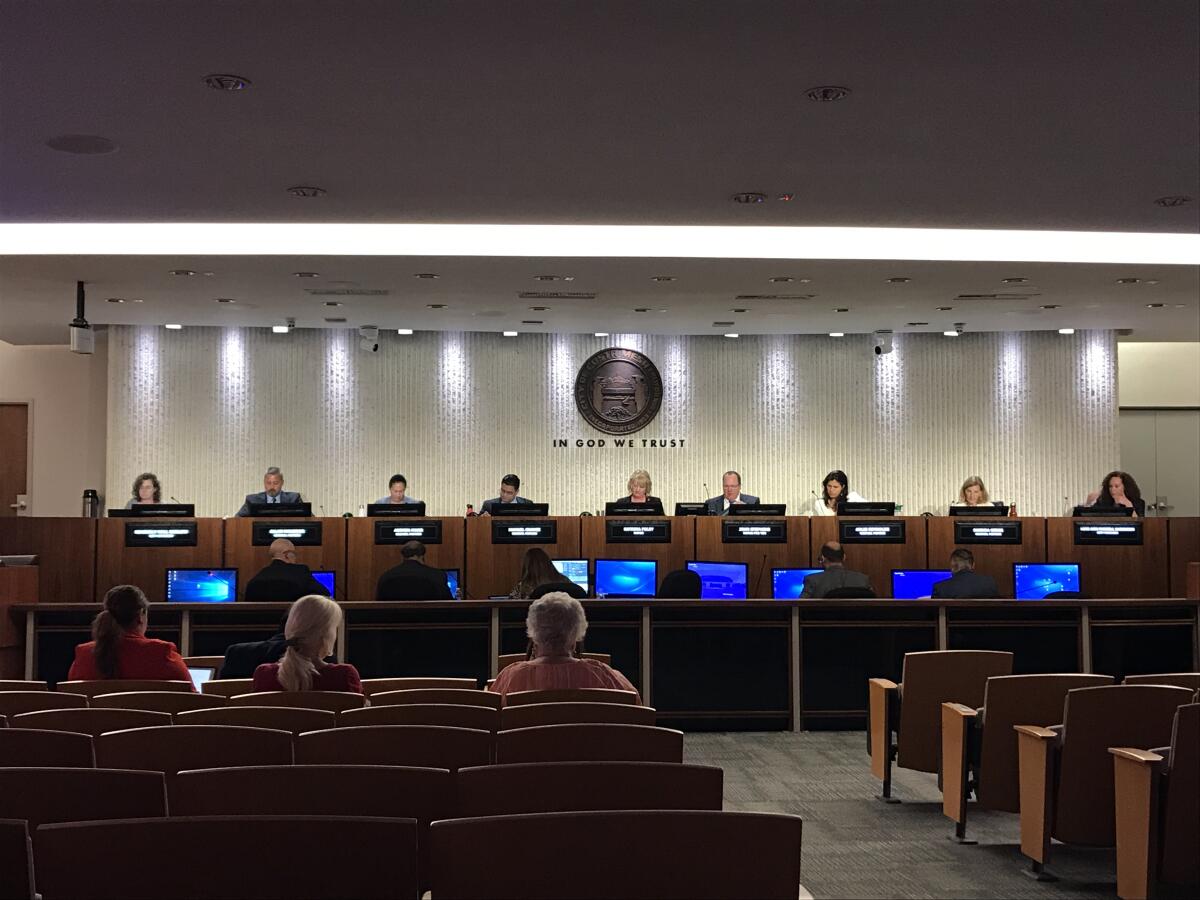Last year’s financial numbers aren’t yet final, but they’re looking better than expected for Costa Mesa

- Share via
Throughout her presentation on how Costa Mesa did financially during the last fiscal year, city Finance Director Kelly Telford emphasized that the numbers aren’t set in stone and could still change in the weeks to come.
“I can’t stress enough that this information is very preliminary,” she told the City Council during a study session Tuesday. “You will probably hear me say that 10 times before this presentation is over.”
However, while the ink may not be dry just yet, the city’s books from the 2018-19 fiscal year are taking on a hue that’s not as red as originally anticipated.
During the last fiscal year, which ended June 30, the city raked in general fund revenues totaling $143.8 million — roughly $2 million more than what was budgeted, according to the preliminary figures Telford presented. On top of that, Telford said, the fund’s operating expenses came in roughly $443,000 lower than expected.
“This is all really good news,” she said. “We were not anticipating being able to present such good information and good news to council tonight.”
Despite that, Costa Mesa is still projected to end the fiscal year with an operating deficit of about $3.8 million in its general fund. However, Telford pointed out that gap is significantly smaller than anticipated and can largely be explained by sizable allocations, some $4.4 million, related to the city’s homeless shelter.
“Had we not had those shelter costs, we actually would have had a net positive increase in fund balance,” she said.
Telford said the city is still going through its annual financial audit, which is expected to be complete in December, and added that “we want to remain cautious as we move through” the current fiscal year.
From a revenue standpoint, the city benefited from higher-than-expected sales- and use-tax collections, which came in roughly $2.9 million above budget. Telford attributed that to increased sales of luxury automobiles and goods, as well as the effects of the Wayfair decision — a 2018 U.S. Supreme Court ruling that became effective April 1 and “now requires businesses with online sales over $500,000 to report sales tax based on point of delivery, rather than point of sale.”
However, those gains were offset somewhat by lackluster results in other revenue streams — namely the city’s marijuana tax and transient occupancy tax, which is charged for motel and hotel stays. Combined, those are projected to come in about $2.37 million below budget.
The underperformance was particularly pronounced when it comes to cannabis. While Costa Mesa anticipated collecting $1.56 million in tax revenue from marijuana-related businesses during the last fiscal year — and once forecast that figure would grow annually and reach an estimated $6 million in fiscal year 2022-23 — the city actually only received $163,803, according to the numbers Telford presented.
While the blame for that falls partly on delays in state permitting and competition from illegal businesses, those in the local cannabis industry say a fundamental reason why the city hasn’t received the green it expected is because the taxes are too high.
Costa Mesa marijuana businesses are subject to a 6% tax on gross receipts. Some operators told the council Tuesday that this levy effectively erodes their profit margin — discouraging businesses from expanding or even opening as originally planned.
Twenty-one owners and executives in the local cannabis industry recently sent the city a letter requesting that Costa Mesa reduce the tax on manufacturing, distribution and testing businesses to 2% and that “all taxation occur upon exit of product from the city, in order to avoid multilayered taxation and to encourage/stimulate intercity business.”
“We absolutely need your help as the legal cannabis market has presented operators with many new, unexpected and unforeseen challenges that are threatening the sustainability of our businesses,” the letter states. “We want to succeed here in Costa Mesa, and we want the city to benefit from our success, but the only way this can happen is that we have to work together.”
Some council members indicated they are receptive to changes that could assist the still-blossoming industry.
“I’m convinced, quite honestly, that adjustments need to be made,” said Mayor Pro Tem John Stephens. “And I think we need to move forward quickly because the industry has been patient.”
Councilman Allan Mansoor said he also is “open to reexamining the cannabis issue and our tax. I know it’s been mentioned sooner rather than later would be better.”
All the latest on Orange County from Orange County.
Get our free TimesOC newsletter.
You may occasionally receive promotional content from the Daily Pilot.








